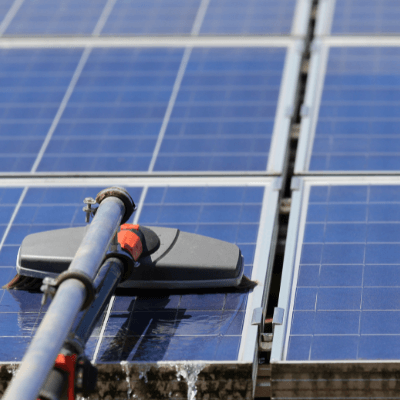Solar panels are lifelong investments that should be taken care of. It is your responsibility as a solar owner to monitor, test, check, and clean your system. Although maintenance of solar systems is low, it is important to conduct electrical and system faults regularly to ensure the system’s optimum work capacity.
This article will cover a checklist of the things you should do to maximize your solar system’s efficiency and output. Here are 8 tips to include in your solar panel maintenance checklist:
1. Check and clean your solar panels.
You should have your solar panels checked for weathering, rust, cracks, and damage every 6 months. Extensive cleaning is not a requirement but the build-up of dust and debris can reduce the efficiency and output of the system. To avoid this, you can clean your own system by removing loose dirt and brushing gently with a soft broom and water.

2. Make sure that your solar panels are installed properly.
Solar panels need to be installed in an unshaded area to absorb and harness the sun’s energy. Exposure to sunlight will help the solar panels to work properly.
3. Check your solar system wiring for damages.
Check your solar system for exposed or faulty wiring. Make sure that they have not been damaged by dirt or water. If damaged, make sure to call your solar installer immediately as this can lead to concerning situations.
4. Troubleshoot isolator switches.
An isolator switch is a safety mechanism that gives solar systems the ability to manually disconnect themselves from the modules in case of emergencies, maintenance, repairs, or installations. Always check if your switches are working properly to avoid accidents.
5. Track your solar system’s energy production.
There are two ways for monitoring your solar system’s energy production. First, you can track it through the inverter’s lights. A green light means that your system is functioning properly while a red, sometimes orange, light means that there is a fault in the system.
Another way is through online monitoring. Most solar providers provide monitoring services to track the system’s daily output. This is useful for spotting any sudden fault drop-offs.
6. Replace the inverter.
A solar inverter is important in the solar energy system as it converts direct current (DC) electricity into alternating (AC) current.
Inverters have a life span of 10-20 years. Since this isn’t as long as the panels, you should budget for an inverter replacement at some point during the system’s lifetime.
7. Keep a logbook of maintenance.
Keep records of inspections, cleaning services, and replacements done on your system. This can be useful in addressing problems in the future.
8. Call a solar expert.
If you’re still unsure with what to do, call a solar expert. Our solar professionals at The Home Pros US will help you understand. Click the “Free Quote” button below to get a free estimate and get the assistance you need.
